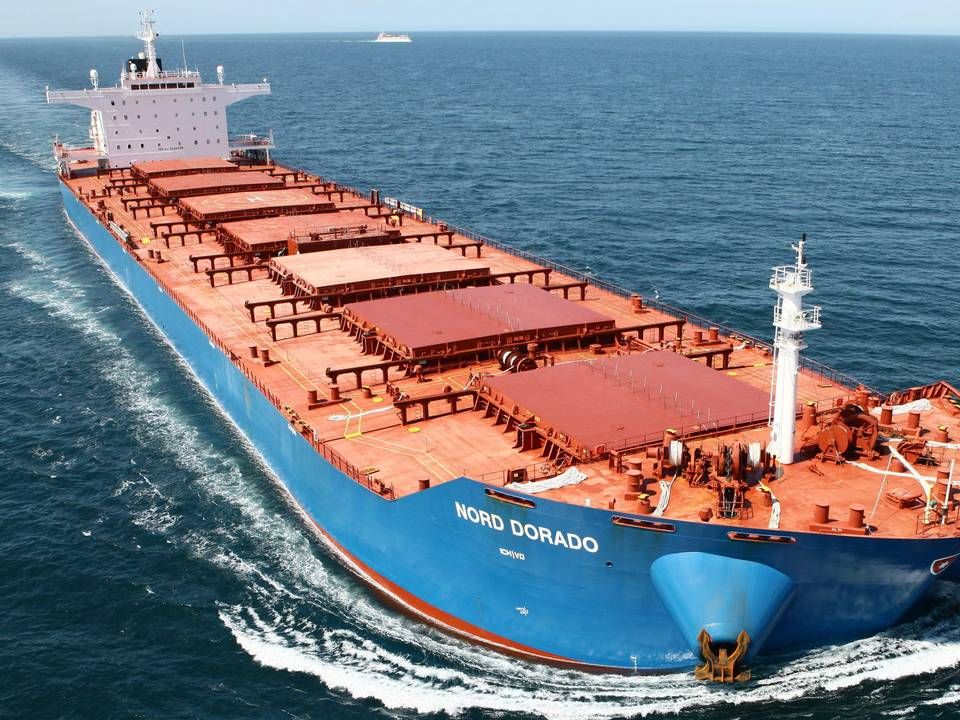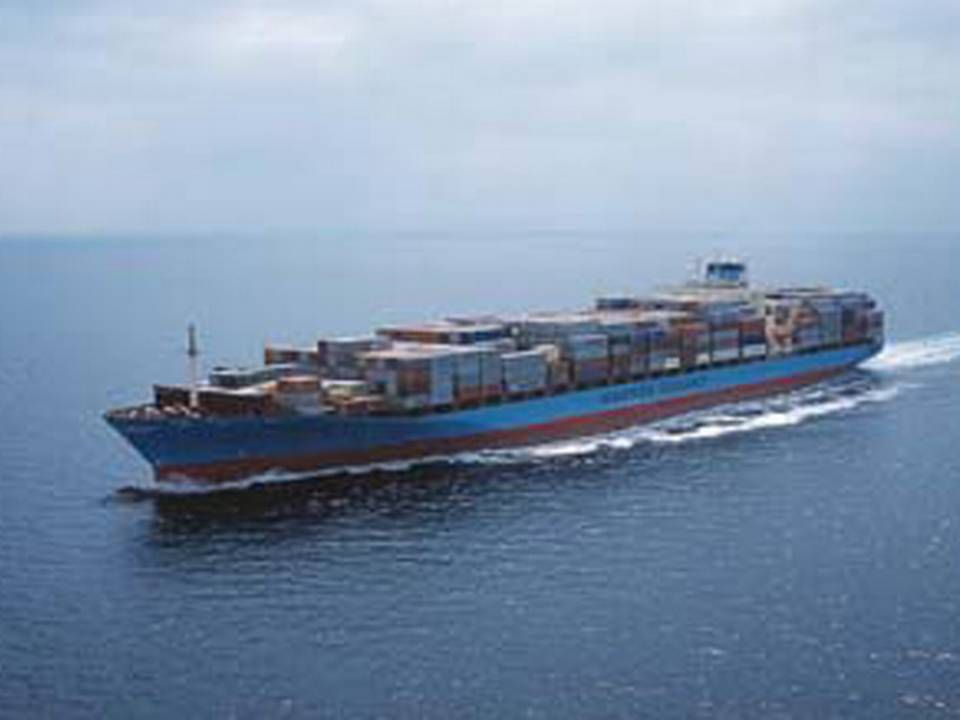Maersk disappointing shareholders so far this year
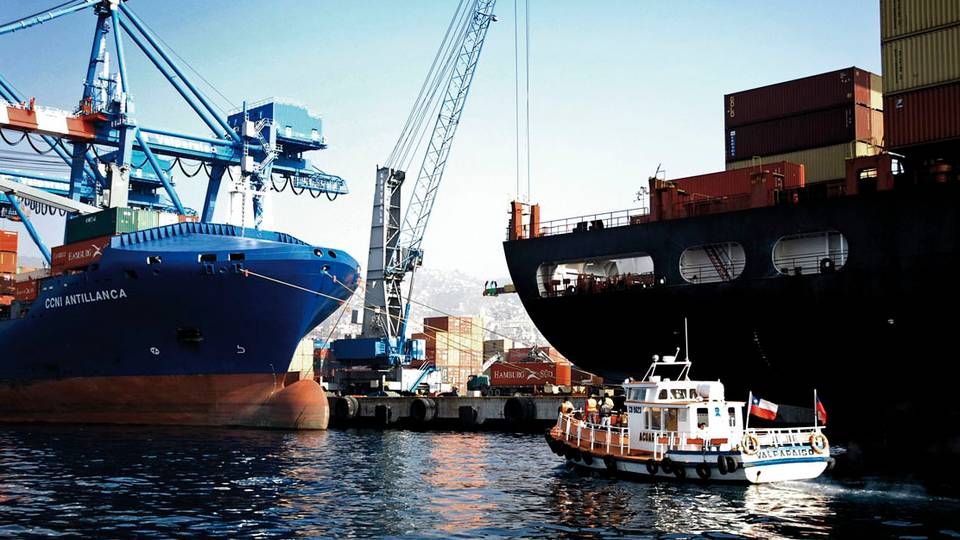
While the stock market is eagerly awaiting the half-year results from the listed shipping and transportation companies, being published these days, the shareholders - at least some of them - have something to look forward to.
Judging by developments among the four major Danish shipping and transportation shares listed on the Copenhagen Stock Exchange, one company in particular looks set to reap major rewards, while another company has delivered a mediocre performance.
A comparison of the share prices of Maersk, DFDS, Norden and DSV shows that Denmark's by far biggest shipping conglomerate, the Maersk Group, performed worse than the other three judging solely by share developments from the New Year and up until today.
"DFDS has once again outperformed the entire shipping sector," Stig Frederiksen, share analyst at Nordea Markets, tells SippingWatch.
He points to this company as a surefire winner that has produced the biggest returns on invested capital since January 1st this year, in comparison to Maersk, DSV and D/S Norden. The share went from USD 86.8 (DKK 591) on Jan 1st to USD 139.3 (DKK 948), a 64.6 percent increase when including dividends and returns (The blue line on the graph below).
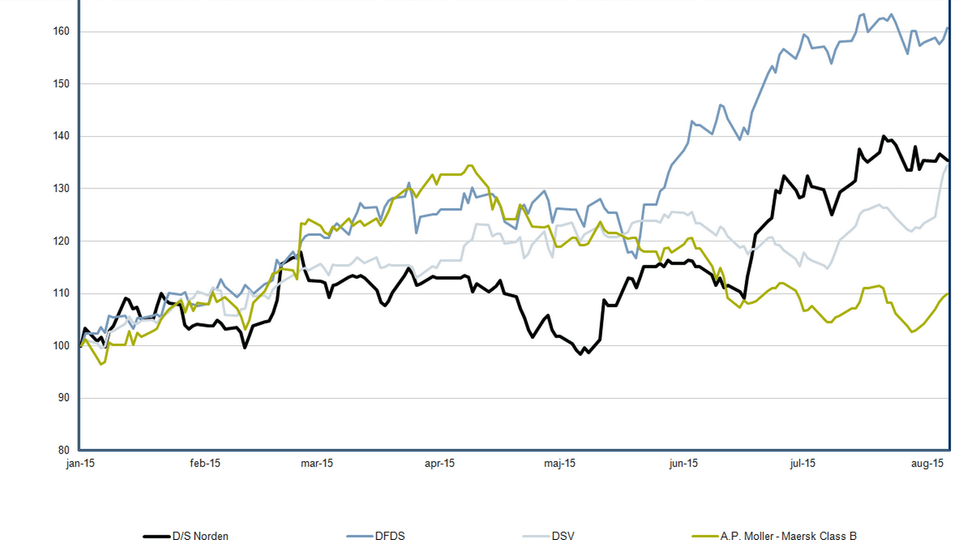
"DFDS has been almost immune to developments in the global economy, and the company has been well-position in Europe. Their management team has handled, for instance, problems related to Russia in a solid manner, almost eliminating said problems, while also managing to create a solid share development which now enables them to pay dividends and buy back shares, something investors appreciate," the analyst explains. It seems that not even the dispute between DFDS and the now defunct employee-owned company SCOP SeaFrance, concerning ferry operations on the English Channel, has been able to sideline the DFDS share.
Stig Frederiksen compares the company to DSV, as both companies operate with a high European exposure to business cycles, and are not like, for example, Maersk struggling with challenges related to overcapacity in the container segment and the low oil price.
DSV good at handling costs
Nykredit share analyst Ricky Steen Rasmussen points to the fact that DSV has been very good at reducing costs as well as securing profits on different markets that the, at this time, less-than-busy Asia-Europe tradelane. As a result, the company's share has increased from USD 27.6 (DKK 188) on January 1st to USD 37.2 (DKK 253) on August 7th.
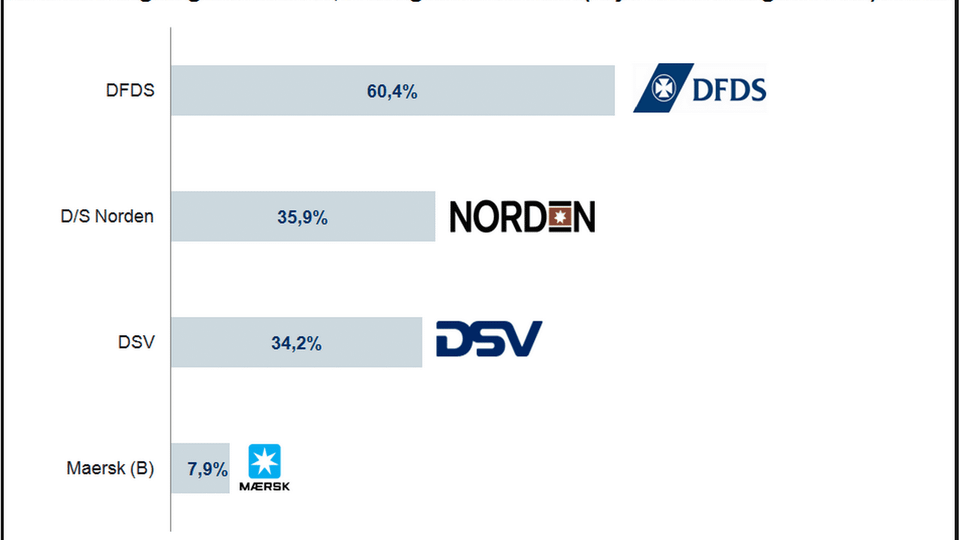
"DSV has benefited from the currently good export in Europe and acceptable export rate in the US, for instance in air freight. Air & Sea has performed best overall, though DSV also received help from exchange rates. They've done a good job of growing the part of the revenue that comes in as earnings, namely their conversion ratios," says Ricky Steen Rasmussen and points to DSV's ability to make money by handling extra cargo volumes with existing crews and cost levels.
Jefferies: DSV leaves competitors in the wake
The fact that DSV does not have capital tied up in material assets such as carriers means that the company, like successful DFDS, can pay dividends to its owners and buy back shares, and the market rewards the company for this.
Upgrade from Norden
Norden, which does business in the struggling dry bulk market, also looks set to achieve a gradually improving result, not least because the carrier also operates in the tanker market. In a new analysis, Danske Bank projects an upgraded full-year guidance from the carrier in relation to Norden's second quarter interim report. Stig Frederiksen agrees with this estimate, and Nordea has already increased its target price.
"After being hit by the lowest rates ever, driven by years of overcapacity caused by a slowdown in Chinese iron ore and coal imports, we have now raised the share price to USD 32.6 (DKK 222)," explains Stig Frederiksen, noting that the balance between supply and demand is continuously improving, and that this development is supported by carriers actively scrapping vessels now.
"The dry bulk market is starting to move, and should take care not to underestimate Norden's history in tanker, a market that is currently enjoying amazing rates," says Stig Frederiksen. The Norden share began the year at USD 19.2 (DKK 131) and had climbed to USD 26.3 (DKK 179) on August 7th.
Maersk finished last
Unlike the three prosperous companies, it will be a Maersk Group under pressure that publishes its second quarter interim report on Thursday, August 13th.
Even though the company's primary business revolves around shipping, the group has several buttons in can manipulate, including oil companies Maersk Oil and Maersk Drilling, and APM Terminals, which operates ports and terminals around the world. However, none of these core business are enjoying truly solid developments at the moment, explains Ricky Steen Rasmussen, who covers Maersk and DSV for Nykredit.
"In terms of Maersk Line, it is right now a discussion about the size of the downgrade, whether we'll get a new full-year guidance of "around" USD 2 billion or "below" USD 2 billion," he says, adding:
"The terminals are suffering from the low cargo volumes, and the Drilling and Oil divisions are hit by the low oil price, which affects both the desire to invest as well as the more long-term strategies for Maersk Oil and Maersk Drilling. Maersk Line is still good at sailing on fixed contracts, and the carrier is among the best in the industry at operating its vessels," says the analyst, though he also warns that the low prices in the spot market will one day also reach the long-term contracts - and when this happens, Maersk Line will be exposed to the low demand for freight and the towering supply of container vessels.
At the beginning of the year, the Maersk B share stood at USD 1,630 (DKK 11,110), and the share had on August 7th climbed to USD 1,759 (DKK 11,990), a 12.2 percent increase including dividend payments related to the divestment of Danske Bank.
DSV made USD 140 million in first half of 2015
Danske Bank: Tanker will improve Norden result
Related articles
DSV made USD 140 million in first half of 2015
For subscribers
Danske Bank: Tanker will improve Norden result
For subscribers


